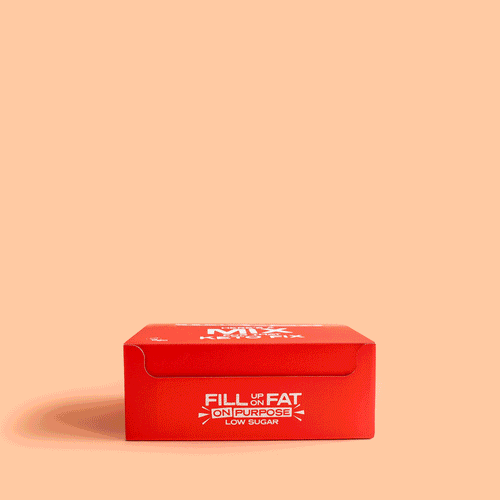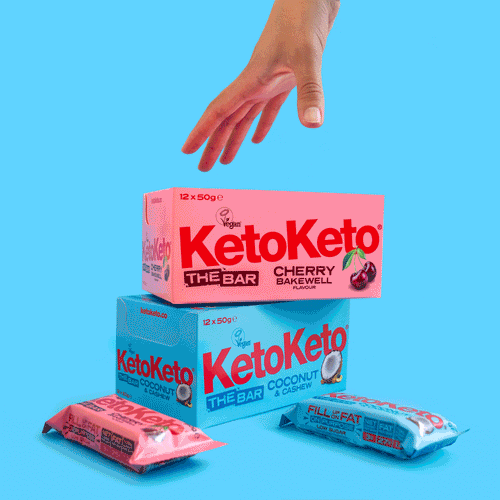Over the past few years, the keto diet has gained a significant popularity for its weight loss success but its benefits go beyond that. One such area that research is starting to uncover is the link between the keto diet and mental health, showing that low-carb, high-fat diets can also enhance brain function and support emotional wellbeing. But how does a low- carb, high-fat diet really influence our mental health?
What is the Ketogenic Diet?
The ketogenic (keto) diet shift’s the body from burning glucose (carbs) to burning fat for fuel. This process is called ketosis, it occurs when your body runs to ketones- an energy source derived from fat. This metabolic state has not only been linked to better physical health but also improved brain function.
How Keto Supports the Brain Function
1. Ketones: A Superior Fuel for the Brain
On a typical diet, the brain relies on glucose for energy. However, those levels can fluctuate throughout the day, leading to energy crashes, mental fog and lack of focus.
When in ketosis, the brain begins to use ketones as its source. Ketones provide a more stable and efficient energy supply, without the crashes. This leads to better focus, enhances mental clarity and lowers brain fog. Some studies suggest that this may be beneficial for people with ADHD and chronic fatigue, where consistent energy levels are crucial.
2. Neuroprotective Benefits
The keto diet offers more than just a stable energy source, it’s also shown to have neuroprotective benefits. Studies suggest that ketosis can help reduce inflammation and oxidative stress in the brain, two factors that contribute to cognitive decline and mental health disorders.
This is why ketogenic diets are being explored as a potential treatment for neuroprotective diseases like Alzhimers and Parkinsons. Ketones can protect brain cells, improve mitochondrial function and potentially slow the progression of these diseases.
3. Improved Mood and Emotional Stability
Mental health is deeply connected to metabolic health, and the keto diet can positively impact both. By stabilising blood sugar levels and reducing insulin spikes, keto helps prevent the drastic mood swings that can come with fluctuating glucose.
Additionally, the diet impact on neurotransmitter balance is significant. Ketones increase levels of GABA, calming neurotransmitters that help reduce anxiety and promote a sense of well-being. This makes keto a promising dietary strategy for people dealing with anxiety and depression.
Keto and Mental Health Disorders:
While more research is needed , the keto diet has shown promise in helping manage several mental health conditions.
1. Depression and Anxiety

Research suggests that the anti-inflammatory and blood sugar regulation effects from the keto diet can help improve symptoms of depression and anxiety. High-carbs, especially those that are rich in sugar, have been linked to mood disorders due to energy fluctuations they cause. By switching to keto, you can reduce these fluctuations and the inflammation that may contribute to mood instability.
Check with a health professional before switching!
2. Epilepsy
The Ketogenic diet was originally developed as a treatment for epilepsy in the 1920’s and it remains a highly effective option for reducing seizures, especially in drug-resistant cases. This neuroprotective effect has sparked further research into how the diet might help with other neurological conditions
3. Cognitive Decline
In ageing populations, keto may help stave off cognitive decline. Research shows that ketones may improve memory and cognitive function, particularly in individuals at risk for Alzhimer disease. The diet’s ability to reduce brain inflammation and oxidative stress is a key reason for its protective effects.
How to Get Started with Keto for Brain Health
If you're interested in exploring keto for its brain-boosting benefits, here are a few tips to get started.
- Focus on Healthy Fats: Choose high-quality fats like avocados, nuts, olive oil and fatty fish. These provide the foundation for a successful keto diet and support brain health.
- Limit Carbs: Keep carbohydrates under 50 grams per day to ensure you enter ketosis.
- Eat Moderate Protein: While protein is important, excessive intake can interfere with ketosis, so aim for moderate amounts of protein-rich foods like meat, eggs, and tofu.
- Stay Hydrated: When starting keto, it’s easy to lose water and electrolytes, so drink plenty of fluids and consider adding sodium, magnesium and potassium to your diet.

The ketogenic diet is more than just a weight-loss tool. Its ability to stabilise blood sugar, reduce inflammation and provide a steady source of energy, makes it a powerful ally in supporting brain function and mental health. Whether you’re looking to improve focus, manage mood disorders or protect against cognitive decline, the keto diet offers promising benefits for your brain.
Ready to give your brain the fuel it needs? Explore keto and you may find that it’s key to unlocking better mental clarity, emotional stability and long-term brain health.
Feel free to share your experience or thoughts on the connection between keto and mental health.
Always seek a medical professional before making dietary changes to ensure the diet is right for you!

The KetoKeto Box Combo
Our bars are made to help curb cravings and keep you fuller for longer. With only 3g of net carbs per bar, they’re the perfect Keto snack for anytime during the day.
Save more when you buy more, by taking advantage of our Box Combo deal. Pick your favourite flavours or try a new flavour for a change.
Maintaining a ketogenic diet can be challenging, especially when it comes to finding tasty and convenient snacks. Our KetoKeto Lemon and Poppyseed Bars are not only delicious but are packed with nutrients you need to support your mental and physical health.
This is not medical advice. Please seek medical advice before starting a new diet.
Studies
1. https://www.frontiersin.org/journals/neuroscience/articles/10.3389/fnins.2018.00377/full2. https://ketologic.com/blogs/articles/keto-brain-health-benefits-of-ketosis-on-the-brain
3. https://charliefoundation.org/am-i-a-candidate/keto-for-brain-health/
4. https://studyfinds.org/aging-brain-ketogenic-diet-memory/?nab=1
5. https://www.medicalnewstoday.com/articles/a-mediterranean-based-ketogenic-diet-may-help-lower-alzheimers-disease-risk
6. https://epilepsysociety.org.uk/about-epilepsy/treatment/ketogenic-diet?gad_source=1&gclid=Cj0KCQjw4Oe4BhCcARIsADQ0cskUo4IufaXo2CHpcrUb4TPbh_e7Y1_21g8KHZuZzPOcnLohgh2cHkcaAph7EALw_wcB
7. https://pmc.ncbi.nlm.nih.gov/articles/PMC6720297/#sec6-ijms-20-03892






